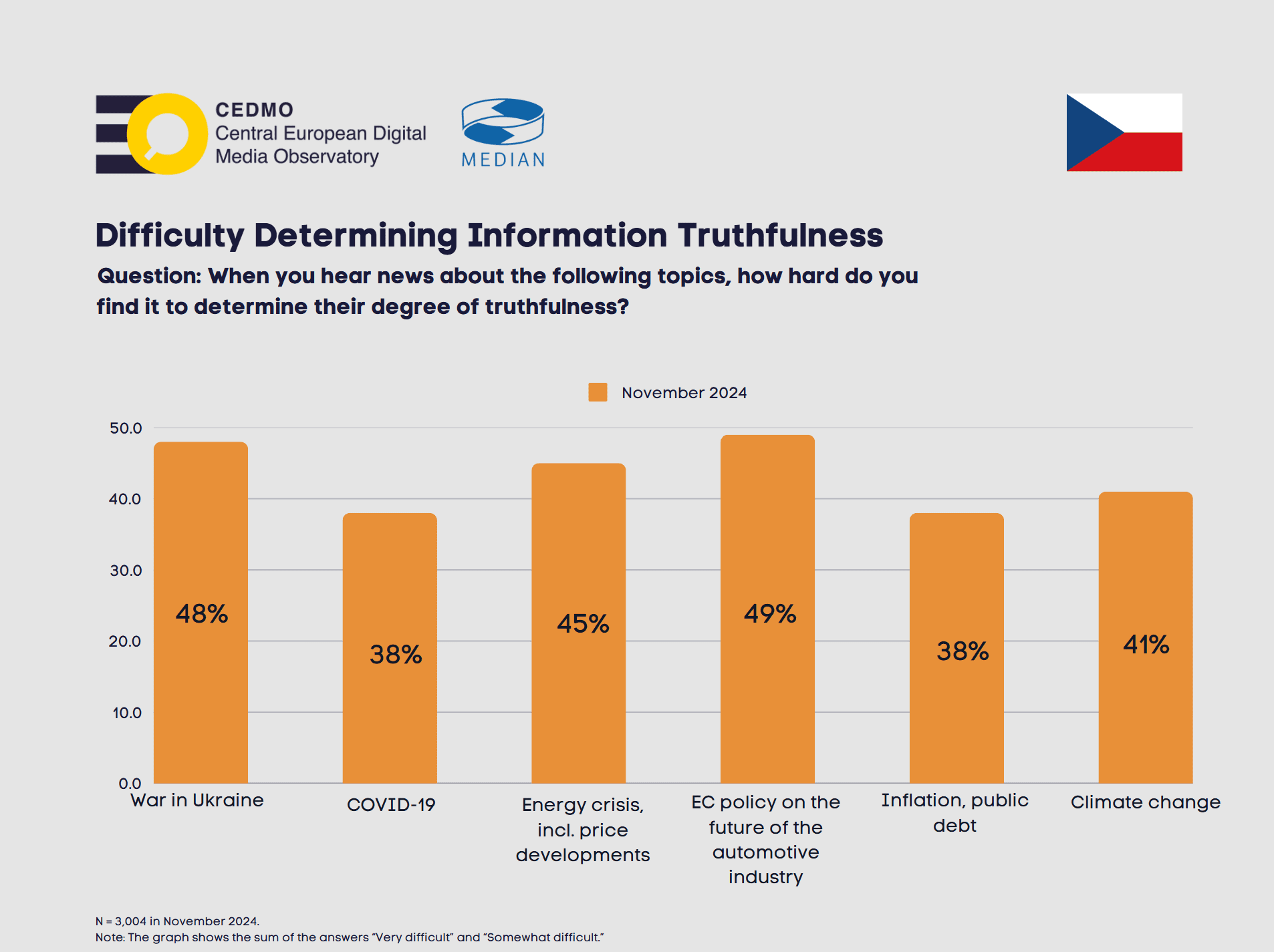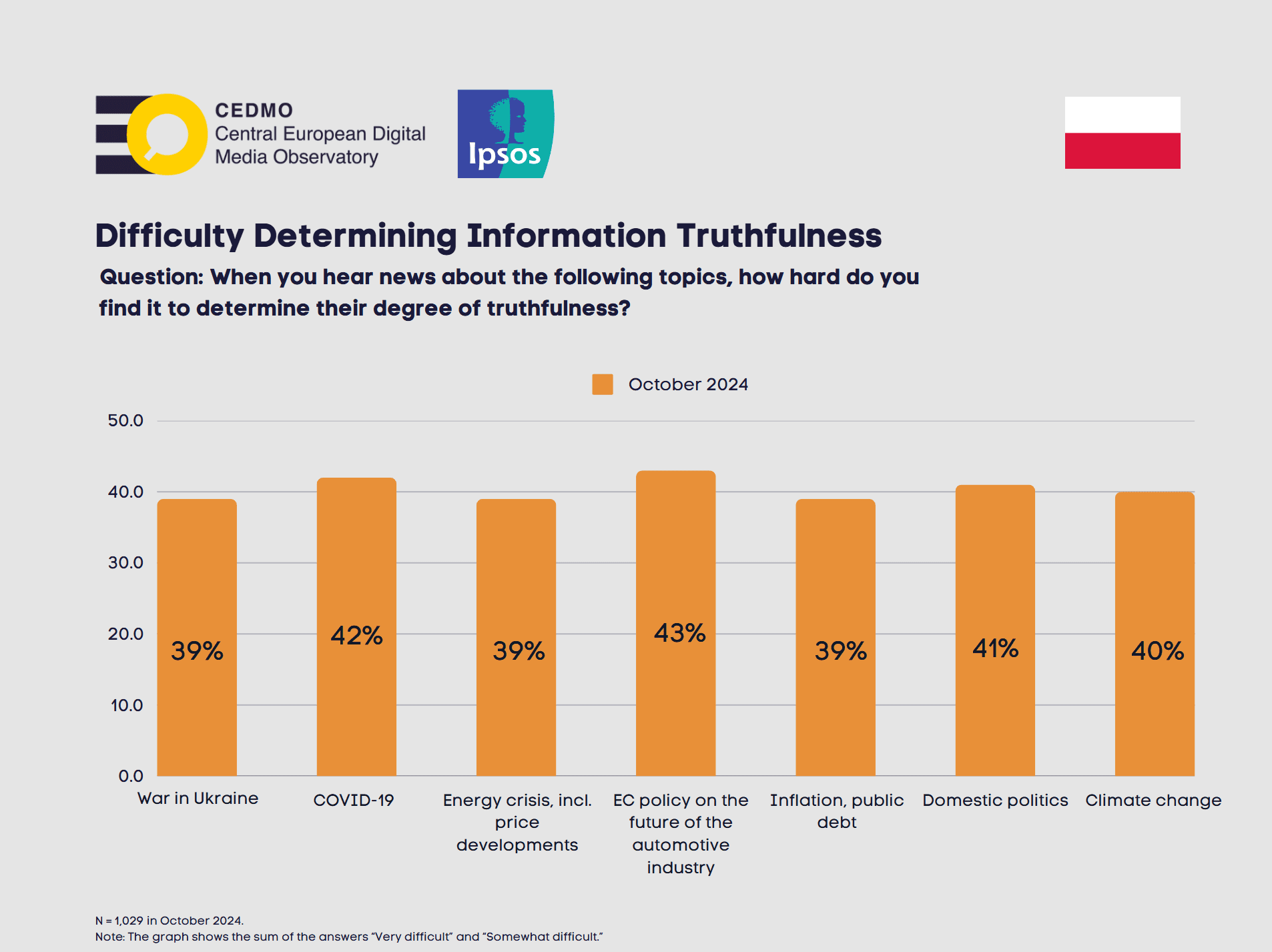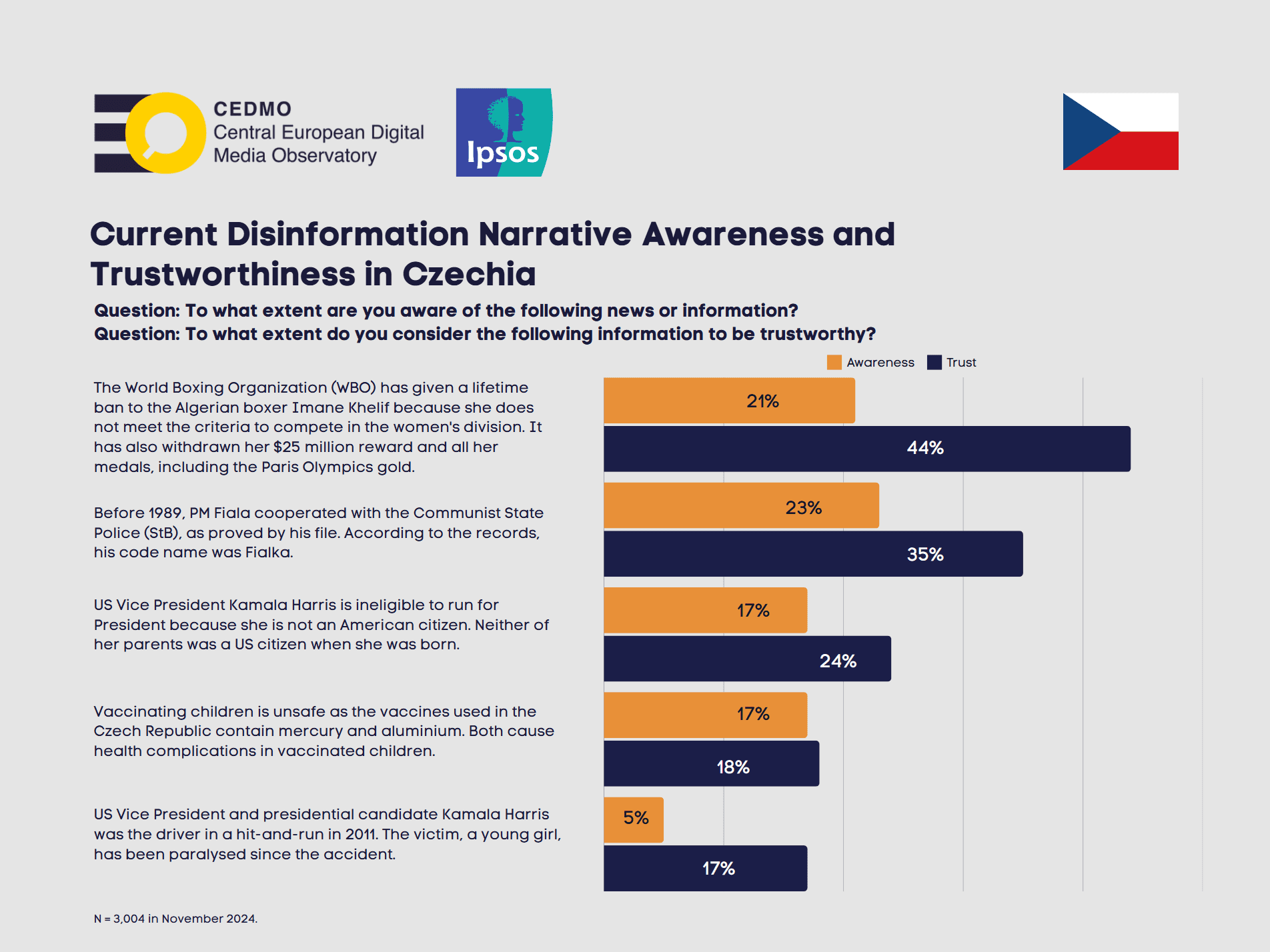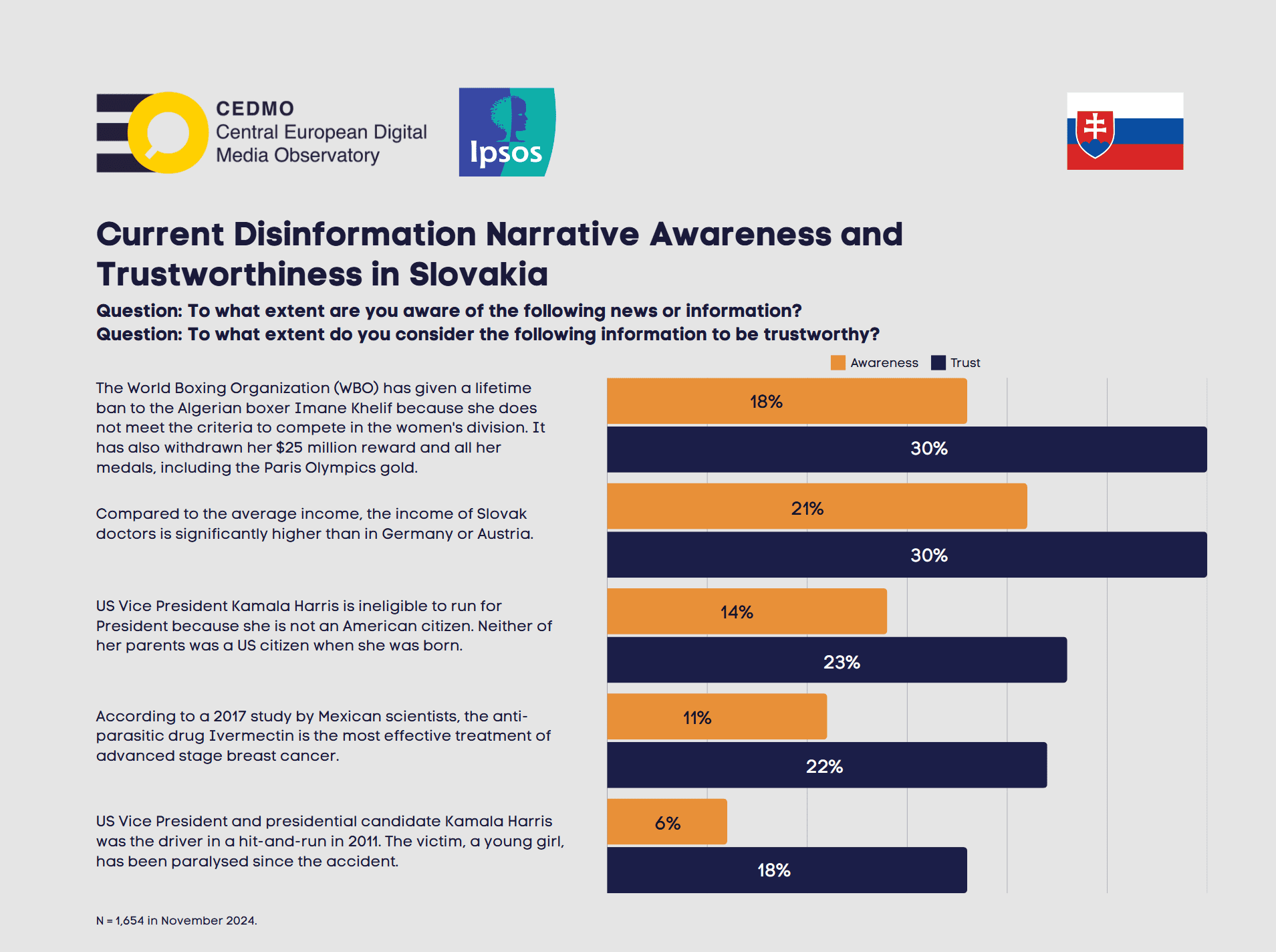
Russian propaganda aimed at Ukraine, floods in Spain, or the referendum in Moldova — these are the main topics of disinformation narratives that fact-checkers from the CEDMO hub identified as the most resonant in Central Europe in the last quarter of 2024. We bring you closer to the specific news in the current edition of the so-called quarterly Fact-checking Brief. It is available in Polish, Czech, Slovak, and English — the preferred language version can be selected in the upper right corner of the page by choosing the flag of the respective country. The brief also contains analyses resulting from a survey conducted in Poland, the Czech Republic, and Slovakia. These provide insights into how difficult it is for Central Europeans to assess the truthfulness of news on specific topics or to what extent selected disinformation narratives seem credible to them.
Cases of Russian Propaganda Aimed at Ukraine
In the last three months of 2024, CEDMO repeatedly dealt with debunking manipulative news attacking Ukraine and its representatives. The most visible case was the news that Volodymyr Zelensky allegedly bought a historic limousine used by Adolf Hitler. However, the news is based on a photomontage published by a fake news website.

Source of the image: Demagog.cz
Another significant narrative was the claim about 18 British soldiers allegedly killed in battles in Ukraine. Demagog.pl and AFP servers proved that this claim is unfounded and the photo of coffins with the British flag actually dates back to 2006. Another spread of disinformation contained fake photos of an alleged mobile morgue from Coca-Cola, which Russian media presented as evidence of large losses of the Ukrainian army in the Sumy region. Fact-checkers from AFP and Demagog.pl showed that it was an edited image. Other cases of Russian propaganda dealt with by fact-checkers included fabricated claims about the alleged sale of Ukrainian land to foreign companies, which was supposed to portray Ukraine as a country subordinate to Western interests.
Difficulty in Determining the Truthfulness of Information
The war in Ukraine was also one of the topics in which we conducted a survey in November in the Czech Republic and Poland to find out how difficult it is for respondents to determine the truthfulness of news on these topics in the media. In addition to the war in Ukraine, topics related to COVID-19, the energy crisis and changes in energy prices, the European Commission’s policy on the future of the automotive industry, inflation and public debt, and topics related to climate change were also tested. According to their statements, it is difficult for 38 – 49% of respondents to determine the truthfulness of the information. Specifically, in the case of the aforementioned war in Ukraine, 39% of Poles and 48% of Czechs confirm the difficulty. The biggest problems for respondents are news related to the European Commission’s policy on the future of the automotive industry – 43% of Poles and 49% of Czechs.

Graph: Difficulty in Determining the Truthfulness of Information (Czech Republic) N = 3004, Source: CEDMO Trends, november 2024

Graph: Difficulty in Determining the Truthfulness of Information (Poland) N = 1029, Source: CEDMO Trends, October 2024
Floods in Spain
Shortly after the floods in Spain, posts appeared on social networks claiming that the destructive consequences were contributed to by the removal of dams and dikes in the Valencia area. As explained in their texts by fact-checkers from AFP, Demagog.cz, and Demagog.pl, the removed water structures were not intended to retain additional water volume during floods; they were small weirs or dikes. The map, which according to the post shows the removed dams and dikes, actually shows existing water structures. Other viral posts contained false claims about the artificial origin of the floods. A video showing a “weather-changing ship” was circulating on social networks. As stated by Demagog.sk and AFP websites, the video actually shows a floating power plant and has no connection to the weather or floods.
Referendum in Moldova
In connection with the Moldovan referendum on the country’s direction towards the European Union, claims appeared that the result was significantly influenced by postal votes, that there was a “mysterious reversal” in the results during the referendum, or that the referendum was rigged. Demagog.cz stated that although the interim result of the vote “turned” at the last moment in favor of supporters of European integration, the entire process was transparent and there was no unnatural reversal at the end of the count. Unfounded claims about fake votes that allegedly appeared at the end of the referendum were also spread by Russian representatives or Polish MEP Grzegorz Braun, as pointed out by Demagog.pl.
Credibility of Disinformation Narratives
In the Czech Republic and Slovakia, where the credibility of current disinformation narratives was investigated (as part of the CEDMO Trends research), the most credible false news concerned the gender of Algerian boxer Iman Khalif, who was allegedly permanently excluded by the World Boxing Organization (WBO) because she does not meet the criteria for competing in the women’s category. Almost half of Czechs (44%) and a third of Slovaks (30%) considered this claim credible. Among Slovak respondents, the same proportion (30%) also considered credible the claim about the salaries of Slovak doctors, according to which the salaries of doctors in Slovakia are significantly higher compared to the average wage than in Germany or Austria.

Graph: Awareness of Current Disinformation Narratives and Perception of Their Credibility (Czech Republic) N = 3004, Source: CEDMO Trends, november 2024

Graph: Awareness of Current Disinformation Narratives and Perception of Their Credibility (Slovakia) N = 1654, Source: CEDMO Trends, november 2024
This quarterly report provides important insights into current disinformation trends in Central Europe. For more details, download the full report in the CEDMO Fact-checking Briefs section.
